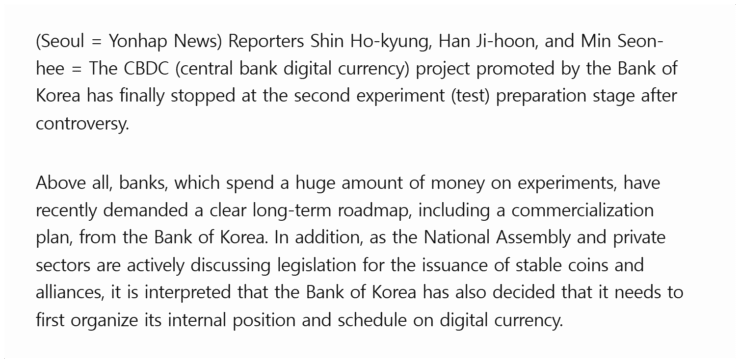South Korea’s central bank has suspended its pilot program for a central bank digital currency (CBDC) as policymakers and financial institutions increasingly turn their focus to stablecoins.
According to local reports from Yonhap News Agency and The Chosun Daily, the Bank of Korea notified seven major banks on Sunday that it was postponing the second phase of CBDC testing. The pilot, which began in April, was initially scheduled to resume later this year.

One senior bank official told Yonhap the delay comes as the central bank re-evaluates how a CBDC would coexist with stablecoins in the country’s evolving financial landscape.
The pivot follows the election of President Lee Jae-myung, who campaigned on a pro-crypto platform that included proposals to legalize stablecoins pegged to the Korean won. Earlier this month, his party introduced a bill to permit companies to issue such tokens, provided they maintain minimum equity capital of 500 million Korean won (about $370,000).
Banks Balk at the High Cost of CBDC Experiments
The pause also reflects frustration among participating banks, who were reportedly dissatisfied with the project’s cost and lack of clarity on commercialization plans.
“The second phase was already on the verge of collapse,” one banking executive said, citing mounting expenses and uncertain returns.
The Bank of Korea is considering rescheduling the next phase of trials to early next year and could narrow participation to fewer institutions, the source added.
The first stage of the pilot ran from April 1 through June 30 and involved 100,000 test users making payments with the digital won. The planned second phase was intended to expand to more merchants and incorporate remittance functions.
But as enthusiasm for stablecoins grows, the appetite among banks for continuing the CBDC project appears to be waning.
Banks Eye Profitability in Stablecoin Ventures
The suspension has emboldened banks to explore stablecoin issuance, a move seen as offering clearer paths to profitability compared to the state-backed digital won.
Last week, it emerged that eight major Korean banks plan to jointly launch a won-backed stablecoin by next year.
Notably, four of those banks—KB Kookmin, Shinhan, Woori, and NongHyup—were among those participating in the initial CBDC trials, suggesting an industry-wide shift in priorities.
Investors responded sharply to the news. Shares of South Korean fintech companies fell on Monday, with mobile payments platform KakaoPay dropping 7% and Hecto Financial declining around 5% by mid-afternoon local time.
As policymakers weigh the implications, the episode underscores the tension between state-led digital currency projects and the private sector’s drive to roll out their own blockchain-based payment instruments.
Quick Facts
- South Korea’s central bank paused CBDC trials to re-assess plans amid stablecoin momentum.
- Seven participating banks complained about the pilot’s high costs and lack of clarity.
- Eight banks are moving ahead with a won-backed stablecoin set to launch next year.
- Shares in major fintech firms declined following the CBDC suspension announcement.





